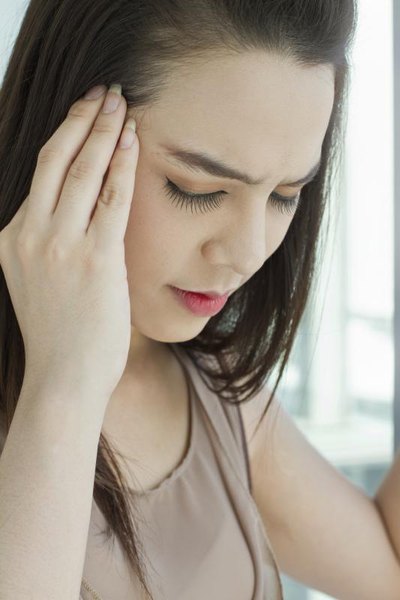
A nutritious lunch should make you feel energized and ready to tackle the rest of your day. Feeling light-headed or dizzy after a meal can bring your productivity to a halt, and the root cause is worth discovering. Two common causes of light-headedness after eating are postprandial hypotension, or low blood pressure, and hypoglycemia, or low blood sugar. Consult your doctor about what is causing your symptoms.
Postprandial Hypotension
Low blood pressure after eating is a common condition, according to the Harvard Health Publications website. After you eat, your digestive, nervous and circulatory systems work hard to process your food. Blood is redirected to the stomach and small intestine. Your heart has to beat faster and harder, and some of your blood vessels narrow. This allows your system to maintain even blood pressure and blood flow to other parts of the body, such as the brain and legs. But for some people, this process doesn't work as it should, and blood pressure decreases all over the body except for the digestive system. This can cause light-headedness. It can also cause falling, chest pain, vision disturbances and even mini strokes.
What to Do About It
There's no cure for postprandial hypotension, but you can make a few lifestyle changes that may improve your symptoms. The Harvard Health website recommends drinking 12 to 18 ounces of water before your meal, which can lessen a drop in blood pressure. Eating a smaller lunch meal may also help because larger meals are more likely to trigger the condition. Also, restrict your intake of simple carbohydrates such as white bread, refined sugars and white rice, which get digested more quickly and contribute to low blood pressure after eating. Choose foods that digest more slowly instead, including whole grains, beans, lean protein and healthy oils.
Reactive Hypoglycemia
A type of hypoglycemia called reactive hypoglycemia may be to blame for your light-headedness after lunch. This type of hypoglycemia occurs in non-diabetics and causes dizziness and light-headedness within four hours of eating. Other symptoms may include anxiety, rapid heartbeat, irritability, shaking, sweating, blurred vision and difficulty thinking. Reactive hypoglycemia is more common in overweight people or those who have undergone gastric bypass surgery, according to the NHS Choices website.
What to Do About It
If your doctor diagnoses you with reactive hypoglycemia, take steps to reduce your symptoms after lunch so you can be productive during the afternoon. The HealthLinkBC website suggests eating a lunch meal that includes all the food groups and eating a smaller meal at lunch and eating throughout the day instead of three large meals a day. Eat fiber-rich complex carbs such as beans and whole grains, and include a source of lean protein in your lunch to keep blood sugar steady. If you like to have dessert with lunch, eat only a small portion.
www.livestrong.com





No comments:
Post a Comment